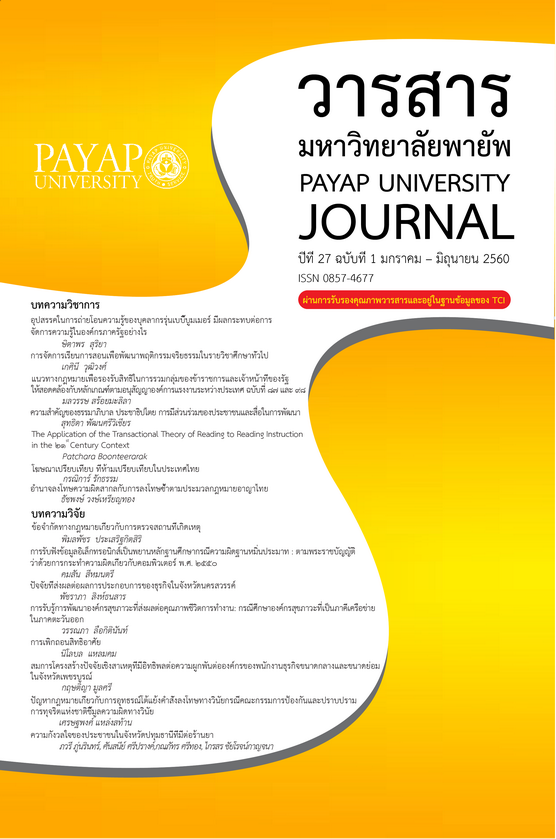อุปสรรคในการถ่ายโอนความรู้ของบุคลากรรุ่นเบบี้บูมเมอร์มีผลกระทบต่อการจัดการความรู้ในองค์กรภาครัฐอย่างไร
Main Article Content
บทคัดย่อ
บทความวิชาการนี้ มีจุดมุ่งหมายเพื่อสะท้อนให้เห็นถึงภาพของอุปสรรคในการถ่ายโอนความรู้ของ บุคลากรรุ่นเบบี้บูมเมอร์ (Baby Boomer) ว่ามีผลกระทบต่อการจัดการความรู้ในองค์กรภาครัฐได้อย่างไร และนำเสนอแนวทางการถ่ายโอนความรู้อย่างยั่งยืน เพื่อจะสามารถรับมือต่อสถานการณ์การสูญเสียอัตรากำลังจากการเกษียณอายุการทำงานที่องค์กรภาครัฐของประเทศไทยกำลังเผชิญอยู่ในปัจจุบัน ซึ่งถ้าหากองค์กรภาครัฐเร่งตระหนักถึงปัญหาที่กำลังจะเกิดขึ้นดังกล่าว ควรจะต้องมีการเตรียมพร้อมรับมือและวางแผนในระยะยาว เพื่อที่องค์กรจะสามารถดำเนินงานต่อไปได้อย่างไม่ติดขัด ตลอดจนบรรลุตามเป้าประสงค์ขององค์กรที่ได้วางไว้ได้ เนื่องจากประเทศไทยกำลังก้าวเข้าสู่สังคมผู้สูงอายุ นำมาซึ่งปัญหาทางด้านการจัดการความรู้ในองค์กรภาครัฐ อันสืบเนื่องมากจากวิกฤตการณ์เกษียณอายุการทำงาน อาทิเซ่น ช่องว่างระหว่างวัยในที่ทำงาน การยืดถือตัวบุคคลจนละเลยระบบการจัดการความรู้ การเคารพตามลำดับความอาวุโสของสังคมไทย และอุปสรรคด้านการปรับเปลี่ยนกระบวนทัศน์ที่ส่งผลต่อการจัดการความรู้ โดยแนวทางในการถ่ายโอนความรู้อย่างยั่งยืน ได้แก่ การลดช่องว่างระหว่างวัย การสร้างค่านิยมในการเรียนรู้ให้แก่บุคลากรขององค์กร การปรับทัศนคติและเปิดใจรับฟังความคิดเห็น และการปรับเปลี่ยนไปสู่กระบวนทัศน์ทางด้านการบริหารทรัพยากรมนุษย์
Article Details
เอกสารอ้างอิง
บุญทัน ดอกไธสง. (2551). การจัดการทุนมนุษย์. กรุงเทพฯ: พิมพ์ตะวัน. พิมพ์ครั้งที่ 2. หน้า 320.
พระราชกฤษฎีกาว่าด้วยหลักเกณฑ์และวิธีการบริหารกิจการบ้านเมืองที่ดี พ.ศ.2546. (2546). ราชกิจจานุเบกษา. เล่ม 120 ตอนที่ 100 ก; 9 ตุลาคม 2546. หน้า 1-16.
มนสิการ กาญจนะจิตรา, สุภรต์ จรัสสิทธิ และชื่นฤทัย กาญจนะจิตรา. (2555). เกษียณเมื่อไหร่ ให้ใคร กำหนด?. เอกสารเผยแพร่ การประชุมวิชาการระดับชาติครั้งที่ 8 “ประชากรชายชอบและความเป็น ธรรมในลังคมไทย”. สถาบันวิจัยประชากรและลังคม มหาวิทยาลัยมหิดล. 341-357 นน.
ราชบัณฑิตยสถาน. (2556). พจนานุกรมฉบับราชบัณฑิตยสถาน พ.ศ.2554. พิมพ์ครั้งที่ 2. กรุงเทพฯ. หน้า 1,544.
วันชัย วัฒนศัพท์. (2546). กระบวนทัศนใหม่ (New Paradigm) กับปัญหาของชาติ. เอกสารประกอบคำบรรยายหลักสูตรการจัดการความขัดแย้งด้านนโยบายสาธารณะโดยสันติวิธี. ศูนย์สันติวิธีและธรรมาภิบาล สถาบันพระปกเกล้า. หน้า 1-7.
วิจารณ์ พานิซ. (2549). การจัดการความรู้. KM Article. สถาบันส่งเสริมการจัดการความรู้เพื่อสังคม (สคส). หน้า 26.
มงคลชัย วิริยะพินิจ. (2553). อุปสรรคและปัญหาของการจัดการความรู้ในเมืองไทย. ประซาซาติธุรกิจ; 16-19 กันยายน 2553. หน้า 34.
มนัสนันท์ หัตถศักดิ์. (2557). การสร้างความรู้ความเข้าใจกระบวนการเรียนการสอน. เอกสารประกอบการ บรรยาย. คณะศึกษาศาสตร์ มหาวิทยาลัยเกษตรศาสตร์. หน้า 10.
ศุภเจตน์ จันทร์สาส์น และ สมภูมิ แสวงกุล. (2555). การเปลี่ยนแปลงโครงสร้างประซากรและความท้าทายในการพัฒนาเศรษฐกิจและสังคมของประเทศไทย. Executive Journal, กรกฎาคม - กันยายน 2555. หน้า 3-11.
สำนักงานข้าราชการพลเรือน. (2554). กำลังคนภาครัฐ 2554: ข้าราชการพลเรือนสามัญ. ศูนย์เทคโนโลยีสารสนเทศและการสื่อสาร สำนักงาน ก.พ. ธีรานุสรณ์การพิมพ์: กรุงเทพมหานคร. หน้า 143.
หนังสือพิมพ์มติชนรายวัน. (2557). สแกนนิสัย "คน 4 เจเนอเรชั่น" แม้ต่างกันก็อยู่ร่วมกันได้. ฉบับวันอาทิตย์ ที่ 1 มิถุนายน 2557. หน้า 18.
Akhavan, p., Jafari, M. and Fathian, M. (2005). Exploring Failure-Factors of Implementing Knowledge Management Systems in Organizations. Journal of Knowledge Management Practice, May 2005. 1 - 9 pp.
Al-Khouri, Ali M. (2014). Fusing Knowledge Management into Public Sector Corporates Excellence Culture: A Review of the Field and the Case of Emirates Identity Authority. Journal of Knowledge Management, Economics and Information Technology. Vol.4, No.3. 1-89 pp.
Alverson, M. (1999). The New Generation Gap. Woman in Business, May/June 51(3). 14 -17 pp.
Armstrong, M. (2008). Strategic human resource management: a guide to action. 4th ed. Replika Press Pvt Ltd., India. 248 pages.
Chang-Albitres, Carlos M. and Krugler, Paul E. (2005) A Summary of Knowledge Management Information Gathered from Literature, Web Site, and state Departments of Transportation. Texas Transportation Institute, The Texas A&M University System College station. Texas, USA 41 pages.
Coolidge, Shelley D. (1999). Generations Apart. Christian Science Monitor. August, 9. Vol.91 (177), page 11.
Remery, c., Flenkens, K., Schippers, J. and Ekamper, p. (2003). Managing an Aging Workforce and a Tight Labor Market: Views Field by Dutch Employers. Population Review and Policy Review. Vol.22. 21 - 40 pp.
Govivatana, Wipanut V. (2001). Generation Gap in the Workplace between Baby Boomers and Generation X. A Research Paper for the Master of Science Degree in Training and Development. The Graduate College, University of Wisconsin-Stout.147 pages
Flaldin-Flerrgard, T. (2004). Diving Under the Surface of the Tacit Knowledge. Conference proceedings. The 5th European Conference on Organizational Knowledge, Learning and Capability. April 2004 in Innsbruck, Austria. 21 pages.
Flail, J. L. (2003). Columbia and Challenger: organizational failure at NASA. Space Policy, 19 (4). 239 - 247 pp.
Nonaka, I. and Takeuchi, FI. (1995). The knowledge-creating company. New York, Oxford: Oxford University Press. 57-71 pp.
Pearlson, K. E. (2001). Management and Using Information Systems: A strategic Approach. New York: John Wiley & Sons.
Polanyi, M. and Nonaka, I. (1966). The Tacit Dimension. Routledge and Kegan Paul Ltd., London. 15-22 pp.
Riege, A. (2005).Three-dozen knowledge-sharing barriers managers must consider. Journal of Knowledge Management, 11 (4). 20 - 29 pp.
Singh, H. and Zollo, M. (1998). The Impact of Knowledge Codification, Experience Trajectories and Integration Strategies on the Performance of Corporate Acquisitions. Financial Institutions Center. The Wharton School, University of Pennsylvania. 42 pages.
Waiganjo, Esther W., Mukulu E. and Kahiri 1(2012). Relationship between Strategic Human Resource Management and Firm Performance of Kenya’s Corporate Organizations. International Journal of Humanities and Social Science, Vol.2 No.10 (Special Issue - May 2012). 62 - 70 pp.
Zemke, R., Raines, c. and Filipczak, B. (2000). Generations at work: Managing the clash of Veterans, Boomers, Xers and Nexters in your workplace (2nd Ed). American Management Association, New York.


